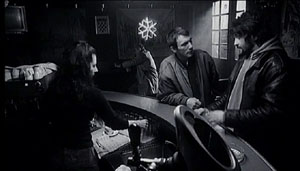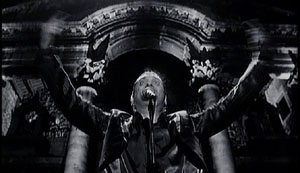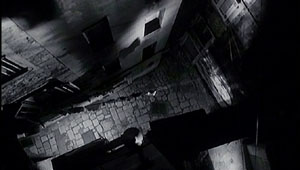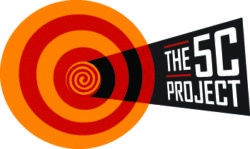British writer Elizabeth Bibesco once said that “irony is the hygiene of the mind” and it seems that namely this purifying type of dark and bitter irony is the key to the post-war Croatian drama “A Wonderul Night in Split” (2004, dir. Arsen Anton Ostoijc). Set in the supposedly euphoric last hours of a New Year´s Eve , the plot however reveals sadness and despair under the romantic surface of beautiful Split.

The dramaturgy circles around several drug victims (both addicts and dealers) while camera literally flies above the old roofs, smuggles throughout narrow streets, penetrates houses which might be architectural attractions by day but by night turn into brothels, suspicious bars and junkie hangouts. The organic plot consists of three parallel short stories interrelated by the narcotic thread and the character of the ruthless dealer Blacky, whose presence is as inevitable as death itself. All of them start as a black humor jokes but end up as ancient tragedies. While the enthusiastic rock chorus in between the acts fakes the overall mood because the main vocal is on dope too.

And here comes irony. It stands out in the contradiction between our prefabricated notion about the place and the possible story it could host, and the reality of what the film is actually about. It is a game of contrasts – starting from the title, which assumes a cheese romantic comedy rather than a drug addiction tragedy and it actually refers to the title of a traditional popular song from Dalmatia; and wrapping up with the technical details that a sunny Mediterranean town is depicted by night, in black and white. It is a place of cheap alcohol and easy sex for tourists but also a place where kids have access to guns, underage girls sell bodies for heroin and even first time sex could not be exciting enough without ecstasy.

Irony provides a distant point of view as well. Together with the alienation effect of the black and white, there is a therapeutic impact too. Along with absurdism, irony has been widely used as a survival tool in the post-war films from Western Balkans such as Pretty Village, Pretty Flame (Federal Republic of Yugoslavia, 1996, dir. Srdjan Dragoevic), Fuse (Bosnia and Herzegovina, 2003, Pjer Zalica), The Tour (Serbia, 2008, Goran Markovic). Surviving loss and destruction through bitter laughter. So you manage to go forward.
Emphasizing on desperation by elaborating on the drug addiction problem might seem an expected and not really original approach to any post-war period but is actually the most truthful to the condition of the affected by the events as there was indeed a drug abuse problem in Split in the 90´s. It was probably the easiest, most accessible and most irreversible way to escape unbearable reality of post-war destruction. Instead of showing physical ruins, the author´s approach is to emphasize on the troubled souls. And sadly enough reality mingles with fiction in a horrifying way – the landmark actor Dino Dvornik who was a popular Croatian pop singer and whose close-up opens the film was found dead after an overdose four years after “A Wonderul Night in Split”´s premiere. Life turns to be the most authentic and cruel scriptwriter.
